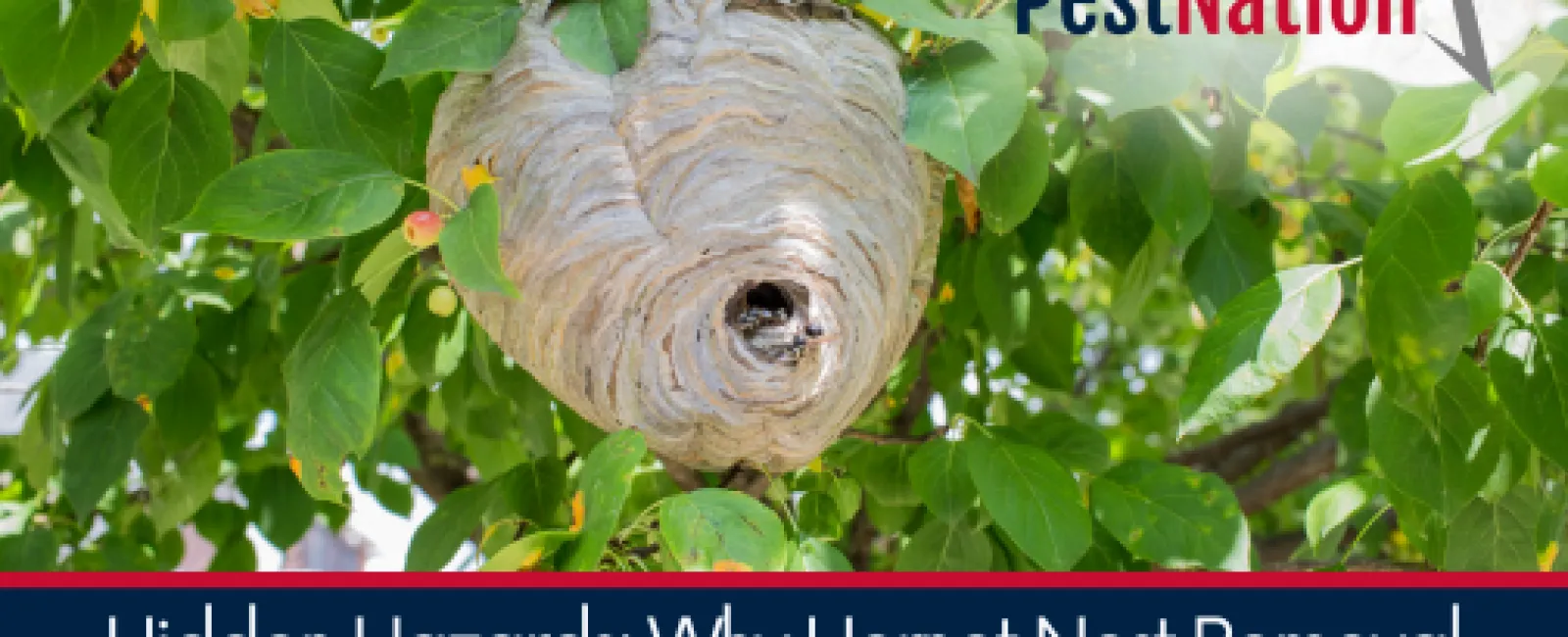Summer is prime time for pest activity across Georgia, and while mosquitoes often steal the spotlight for seasonal annoyance, there are other pests that pose an even greater danger to homeowners: hornets. These aggressive stinging insects are known for their painful stings, territorial behavior, and highly concealed nests. For pest control professionals like those at PestNation, hornets aren't just a side issue—they're a serious concern, especially when nests are discovered in unexpected places.
Recently, while performing a routine mosquito treatment, one of our technician, Shelby, uncovered a hidden hornet nest tucked discreetly in a homeowner's yard. This is more common than many realize. Hornet nests can be built high in trees, under eaves, inside wall voids, and even beneath decks. When disturbed, hornets can become extremely aggressive, attacking in swarms and posing real health threats.
In this article, we explore why hornet nests are more than just a nuisance, what signs to look out for, and why professional removal is essential for keeping your property safe.
Understanding Hornets: Behavior and Habits
Hornets are a type of wasp and are among the most aggressive stinging insects found in Georgia. The two most common types you might encounter are the European hornet and the bald-faced hornet, both of which are known for their large size and formidable nesting behavior.Hornets build their nests using chewed wood pulp, creating a paper-like structure. These nests can grow quite large over the season, housing hundreds of worker hornets by late summer. While hornets do play a small ecological role by preying on other insects, the danger they present to humans far outweighs their benefits in residential settings.
Some of their behavioral traits include:
- Territorial aggression: Hornets defend their nests fiercely. Even walking too close to a hidden nest can provoke an attack.
- Multiple stings: Unlike bees, hornets can sting multiple times.
- Allergic reactions: Stings can cause severe allergic reactions in some individuals, leading to potentially life-threatening situations.
Where Hornets Like to Nest
One of the trickiest aspects of dealing with hornets is that they often choose hard-to-see or hard-to-reach places to build their nests. Some common nesting sites include:- Underneath decks and porches
- Inside wall voids or attics
- Beneath roof overhangs
- In bushes, shrubs, or hedges
- High up in trees
- Attached to utility poles or sheds
In the case of our recent service call, the hornet nest was partially hidden in dense foliage, right near a frequently used path to the backyard. The homeowners had no idea it was there until the technician spotted suspicious hornet activity.
Why You Should Never Remove a Hornet Nest Yourself
While it might be tempting to spray a hornet nest with store-bought insecticide or knock it down with a stick, DIY hornet control is dangerous for several reasons:
While it might be tempting to spray a hornet nest with store-bought insecticide or knock it down with a stick, DIY hornet control is dangerous for several reasons:
- Risk of swarming: Hornets will aggressively defend their nest if they feel threatened. Without protective gear and knowledge of their behavior, you could be putting yourself in harm's way.
- Hidden nests: Even if you find one nest, there could be more nearby. Professionals know how to inspect the surrounding areas to ensure complete treatment.
- Lack of proper tools: Pest control professionals use specialized tools and protective suits to remove nests safely and thoroughly.
- Potential structural damage: If the nest is inside a wall or roof cavity, improper removal could lead to home damage or incomplete eradication.
What a PestNation Technician Does During Hornet Nest Removal
At PestNation, our technicians are trained to handle hornet infestations with precision and care. When a nest is discovered, here's what the process typically involves:- Assessment: The technician locates the nest and evaluates the level of hornet activity. This may include checking surrounding areas for satellite nests.
- Identification: Proper identification of the species is crucial. Some stinging insects resemble hornets but require different treatment methods.
- Protective equipment: Technicians wear full protective gear, including bee suits and gloves, to prevent stings during removal.
- Targeted treatment: Using professional-grade insecticides and dusts, the nest is treated at night or early morning when hornets are less active.
- Nest removal and cleanup: After ensuring all hornets are eliminated, the nest is carefully removed. The area is then cleaned and inspected for re-infestation risk.
- Preventive advice: Homeowners receive tips on how to avoid future hornet issues, including sealing entry points and maintaining yard hygiene.
What to Do If You Spot a Hornet Nest
If you notice increased hornet activity around your home, or if you spot a nest, here are some important steps to follow:- Stay away from the nest. Do not disturb or attempt to investigate the area.
- Keep children and pets indoors. Hornet stings are particularly dangerous for kids and small animals.
- Call a professional pest control service. Contact PestNation for a safe and thorough inspection and treatment plan.
- Avoid using DIY sprays. Most over-the-counter sprays are not effective for large nests and may only aggravate the hornets.
How to Prevent Hornet Infestations
While it's not always possible to prevent hornets completely, there are steps you can take to make your property less inviting:- Seal entry points: Inspect your home's siding, vents, and roof for gaps or cracks where hornets could nest.
- Maintain landscaping: Trim overgrown bushes and trees to reduce hiding spots.
- Remove food sources: Keep outdoor garbage bins sealed and clean up food debris after outdoor meals.
- Install screens: Make sure attic and vent openings are covered with fine mesh screens.
- Regular inspections: Schedule seasonal inspections with PestNation to catch issues early.
Hornets are more than just an outdoor annoyance. When their nests go unnoticed or untreated, they can create hazardous conditions for homeowners, guests, and pets alike. As our technician Sergio discovered during what was supposed to be a routine mosquito service, pests don't always stick to the script.
Professional pest control services like PestNation are trained to identify, treat, and remove these dangerous insects safely. If you suspect hornet activity near your home or business, don't wait until someone gets stung. Contact PestNation to schedule an inspection and take the sting out of your summer.

